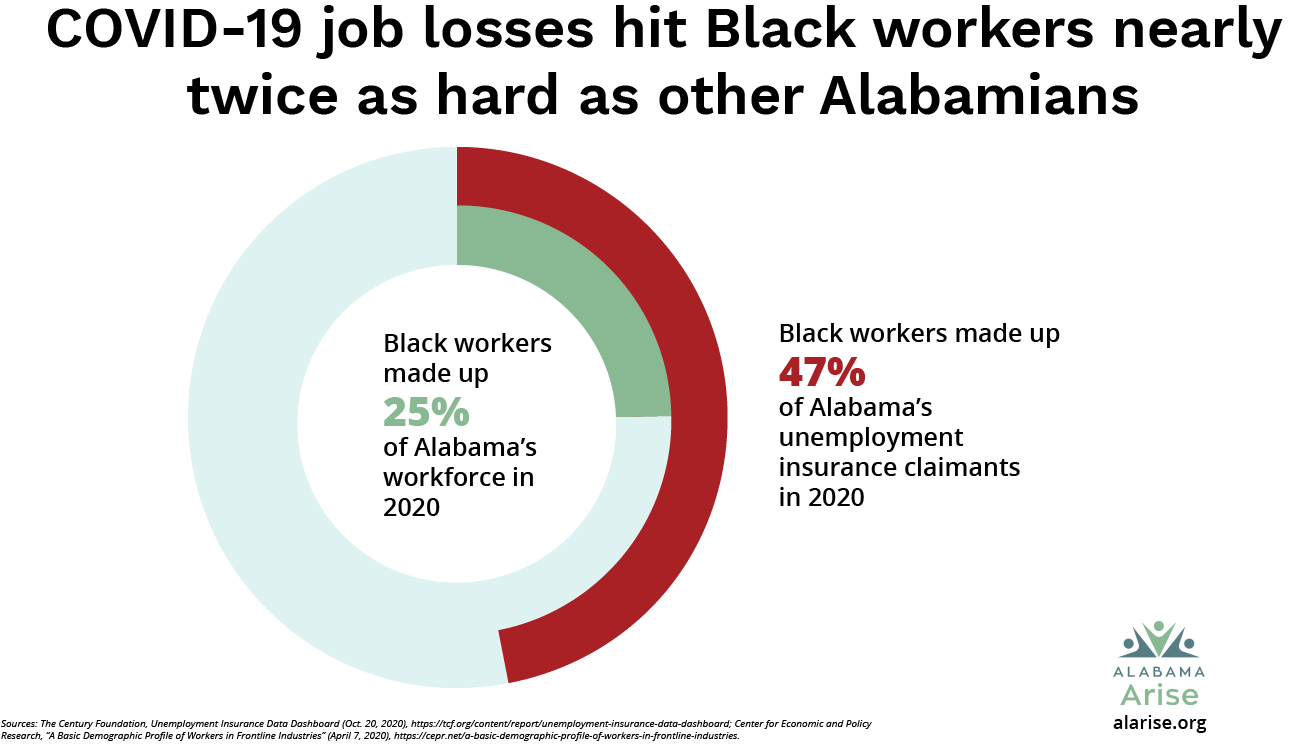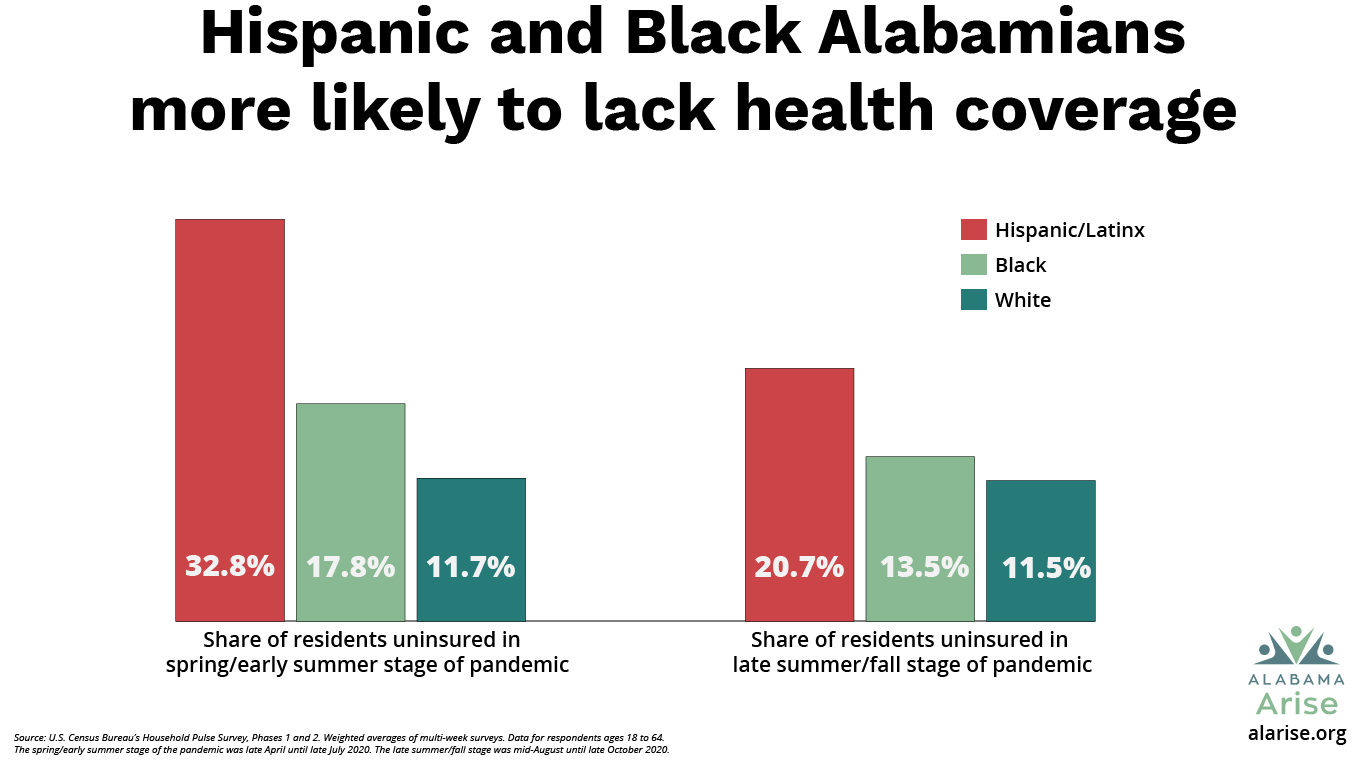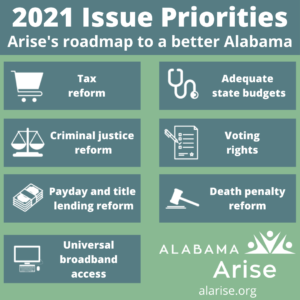The American Rescue Plan Act of 2021 will reduce poverty while expanding health care, housing and nutrition protections across Alabama, according to analyses by Alabama Arise and other research organizations. President Joe Biden signed the new federal COVID-19 relief package into law Thursday.
The law will slash poverty by expanding tax credits to struggling households and boosting unemployment insurance (UI) benefits. It also will provide Alabama $2.3 billion of federal assistance to help avoid cuts to education and other vital services. Local governments in Alabama will receive another $1.7 billion in federal funding.
Some of the relief package’s most transformative investments will come in health care. The law will increase the affordability of health coverage through the marketplace created under the Affordable Care Act (ACA). And it will create new federal incentives that would more than offset the state’s cost to expand Medicaid, providing health coverage to hundreds of thousands of Alabama adults with low incomes.
“The American Rescue Plan Act throws Alabama’s struggling families a much needed lifeline,” Alabama Arise executive director Robyn Hyden said. “And it offers budgetary breathing room for policymakers to tackle chronic problems, address longstanding racial and gender inequities and build an economy that works for every Alabamian. Medicaid expansion should be at the very top of our legislators’ to-do list.”
A new pathway to Medicaid expansion in Alabama
The relief package could bring overdue peace of mind to some 300,000 Alabamians living in the health coverage gap. They earn too much to qualify for Medicaid under the state’s stringent income limit but too little to qualify for subsidized ACA marketplace plans.
Nearly seven in 10 Alabamians support expanding Medicaid to cover these adults, a statewide poll found last month. If Gov. Kay Ivey agrees to expansion, the law would give the state a 5-percentage-point increase in federal funding for its traditional Medicaid coverage for two years.
That would bring Alabama an additional $940 million over two years, the Center on Budget and Policy Priorities (CBPP) estimates. And it would remove any remaining financial barrier to Medicaid expansion, said Jane Adams, the Cover Alabama campaign director for Alabama Arise.
“This law is a much-needed step toward closing the health coverage gap in Alabama. We have no time to waste,” Adams said. “Tens of thousands of people have died in the South ‒ my home ‒ because they couldn’t afford to get the health care they needed.
“Medicaid expansion is the single biggest step Alabama can take to weather and recover from the COVID-19 pandemic and move our state forward. Congress did their job. Now it is time for Governor Ivey and our state lawmakers to do theirs and immediately expand Medicaid in Alabama.”
Enhancements to existing Medicaid, marketplace coverage
The relief package also makes multiple coverage improvements for tens of millions of Americans with Medicaid or ACA marketplace plans. Among other changes, the law:
- Reduces or eliminates marketplace premiums through 2022. Subsidies will increase across the board, and no one will pay more than 8.5% of income for their health plan.
- Eliminates COBRA premiums through September 2021.
- Protects against tax liability on premium assistance because of income fluctuation.
- Increases funding for COVID-19 testing and vaccine distribution.
- Gives Alabama the option to increase the income limit and coverage period for postpartum Medicaid coverage.
- Increases federal funding for home- and community-based Medicaid long-term care services.
- Increases federal funding for substance abuse prevention and treatment and a broad spectrum of mental health services.
Child Tax Credit, EITC expansions will reduce poverty across Alabama
Poverty rates will fall nationwide thanks to tax credits and stimulus payments in the American Rescue Plan Act, studies predict. One of the greatest gains will result from a Child Tax Credit (CTC) expansion that could cut the U.S. child poverty rate in half, a Columbia University analysis found.
The relief package makes the full CTC available to children living in families with low or no earnings. It increases the credit’s maximum amount to $3,000 per child and $3,600 for children under age 6. And it extends the credit to 17-year-olds. This CTC expansion will help four in five Alabama children (or nearly 1.1 million), as well as nearly 1 million adults, the Institute on Taxation and Economic Policy (ITEP) estimates.
Direct payments and expanded tax credits will help Alabamians make ends meet as well. Among other changes, the law:
- Provides a one-time payment of $1,400 per person for individuals making up to $75,000 and couples making up to $150,000. Individuals with incomes up to $80,000 and couples with incomes up to $160,000 are eligible for partial payments. These stimulus payments will benefit 91% of adults (3.1 million) and 92% of children in Alabama, ITEP estimates.
- Raises the maximum Earned Income Tax Credit (EITC) for working adults without children from roughly $530 to roughly $1,500. The law also increases the income limit for these adults to qualify from about $16,000 to at least $21,000.
- Expands the age range of EITC-eligible workers without children. Younger adults aged 19-24 who are not full-time students can qualify now, as can people 65 and over.
- Helps more than 280,000 Alabamians with the EITC improvements mentioned above, CBPP estimates. The vast majority of the Alabamians who will benefit (205,200) have annual incomes below $20,400, according to ITEP.
Boosts to SNAP, unemployment, housing assistance to help Alabamians make ends meet
The American Rescue Plan Act includes additional provisions to keep more households fed and housed. Most urgently, it extends until Sept. 6 the supplemental $300 federal UI benefits that were set to expire this weekend. This extension more than doubles Alabama’s maximum total weekly benefit to $575, or roughly 60% of median household income.
The law also provides $37 billion nationwide in rental and mortgage assistance to help prevent evictions and foreclosures. For Alabama, this would mean an increase of more than 1,400% from 2020 Emergency Solutions Grant funding if states receive funding proportionate to their populations.
In addition, the package continues a 15% boost to food assistance under the Supplemental Nutrition Assistance Program (SNAP) through September. This increase will help nearly 800,000 Alabamians and bring $64 million in additional SNAP benefits into Alabama, CBPP finds.
The plan takes many other steps to alleviate hardship. Among other changes, the law:
- Provides Alabama with $10 million in emergency pandemic Temporary Assistance for Needy Families (TANF) funding. This money is usable for one-time benefits like cash assistance, rental assistance or clothing allowances.
- Allows states to continue Pandemic EBT (P-EBT) benefits through early September. P-EBT replaces the value of meals that children miss when schools are closed.
- Increases the monthly allocation for fruits and vegetables in the Women, Infants and Children (WIC) program from $9 to $35 for four months.
- Makes the first $10,200 of UI benefits non-taxable for households with incomes below $150,000.
- Excludes discharged student loan amounts from taxable income calculation through 2026.
“Everyone should know the security of having food on the table and a roof overhead,” Hyden said. “The American Rescue Plan Act will help ease Alabamians’ suffering during the COVID-19 pandemic. And it will lay a foundation to build a stronger, more inclusive Alabama in its aftermath.”





 Jane Adams, campaign director of Alabama Arise and director of
Jane Adams, campaign director of Alabama Arise and director of 
